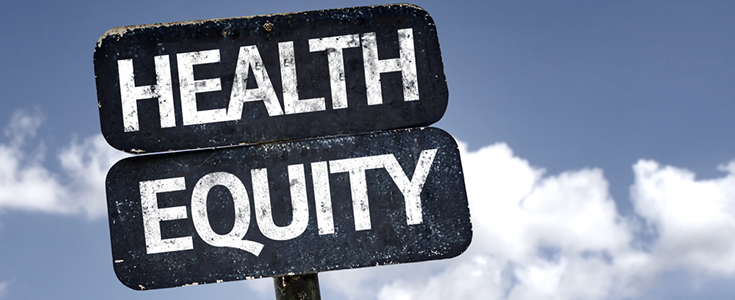
Biases: Why we all need to think about health equity
This summer, when I was responding to the Health Equity Staff Survey we were all asked to complete, I had to pause when I hit question 5, "In your own words, what does health equity mean?" I could certainly repeat the key phrases like "all people should have the opportunity to reach their full health potential" or "people should not be disadvantaged from attaining good health due to social and economic status, racism or other socially determined circumstance" . . . But in my own words, what does health equity mean to me, personally, and as a nurse? I think that is something we all need to stop and reflect on.
Health equity
Health equity means that all people can reach their full health potential and should not be disadvantaged from attaining it because of their social and economic status, social class, racism, ethnicity, religion, age, disability, gender, gender identity, sexual orientation or other socially determined circumstance.
Health equity, promoting conditions in which every person can achieve their full health potential, is now a stated value in our new WRHA Strategic Plan. Although health care providers have always valued equity, promoting equity is now an explicit Regional priority. It's something we need to be deliberate about - every day - in our work. Operational planning to address Regional strategic priorities will require keeping equity in full focus.
The nursing profession certainly has a solid foundation in relationship-based, person-centred care, trauma-informed practice, dignity and respect, recognizing the role of family and community - all the things that together accrue to promoting equity in health at the bedside and in planning health services. But at the same time, real change requires us to honestly reflect on how biases, racism and uneven power dynamics are also at play within some of our processes and traditions.
I thought back to the many roles I have played and how equity has been part of my practice even before we were using the term. At the bedside, I can recall a particularly angry young man who wasn't being cooperative with the care I was trying to provide. Although in a hurry and getting flustered, I paused to consider the circumstances and possible traumas that led to his reaction. I said something like, "I see this is really frustrating for you - what can I do differently to make this better?" That simple question and genuine listening altered the power imbalance and we started over. Was that health equity in action? Yes!
Quality and Patient Safety Week
The theme for Quality and Patient Safety Week is Patient Flow. Patient flow is a patient safety issue: it's about providing the right care, in the right place, at the right time. During Quality & Patient Safety Week, a number of training opportunities, presentations, and other information sharing events will be offered throughout the Region, to assist in raising awareness that Patient Flow = Patient Safety.
A highlight of the week will be a presentation by staff members who have implemented initiatives that improved access and transition to care. Join us to hear their success stories on Friday, October 28, at John Buhler - HSC, from 11:00-1:00, Room 500.
Later, as a manager, I noted that some of our services and approaches may not be appropriate or welcoming for some of the clients we were trying to serve. I heard my staff make comments about "non-compliant patients" or someone being a "no show again" in less than friendly tones. I wondered what barriers existed for these clients, like poverty, limited transportation options, and lack of childcare. What could we be doing differently to remove barriers and avoid assumptions? Reframing this with staff led to positive team brainstorming and changes to our services and approach. Was this health equity in action? Yes!
Now as a health care leader in a VP role I have similar responsibilities at a different level. I still ask myself the same kinds of questions when making decisions and considering options: Are there assumptions and biases that I am bringing to this issue? How is this issue affecting people across the social and economic spectrum, particularly those most disadvantaged? How will our decisions affect the health gap? Health equity is part of my thinking and informs my work every day.
I am convinced that there is a lot we each can do to contribute towards closing the health gap no matter where we work in the health care system. The 2014 Community Health Assessment shows us we still have a long way to go. The observed health gaps are strongly tied to poverty, discrimination, racism, and oppression - topics often not easily discussed. Yet, without bringing to light issues that affect the health and wellbeing outcomes of clients, we can perpetuate the status quo and uneven power relations.
We will never stop learning about health equity, cultural safety, and reconciliation. But we must strive every day to listen a little deeper and provide the best care possible in new ways to meet real needs. As nurses, we can make a difference.
What does health equity mean to you?
Related Links
National Centre for Truth and Reconciliation - The National Centre for Truth and Reconciliation honours the sacred Truths told by the nearly 7,000 Survivors, intergenerational Survivors, and others affected by the Residential Schools and their legacy courageously shared with the Truth and Reconciliation Commission of Canada.
The Patient Dignity Question - This simple, open-ended question, "What do I need to know about you as a person to give you the best care possible?" seeks identify patient issues and the sometimes 'invisible' factors that might not otherwise come to light.
The Manitoba Poverty Tool - This resource recommends asking clients, "Do you ever have difficulty making ends meet at the end of the month?" This question can open the conversation for assisting clients in accessing the resources they need to be healthy.
We All Have A Role To Play - This resource asks 10 prompting reflective questions for health providers. It includes a diagram to illustrate the important convergence of Patient Care, Health System Leadership and Community Partnerships to promote Health for All.
Can you Make The Month? Think you could last a month with the resources of someone living in poverty in Winnipeg? Challenge your perspective with this unique online experience.
Health Equity in the WRHA - A priority for everyone
United Way Campaign - How the WRHA helps build a healthy community for all
Oculys - Hospital software that generates real time data for real time decisions
Accountability in Action - A Message from Milton
Pain Management: Perspectives, Procedures & Prescriptions - Deer Lodge Centre, November 10, 2016. 9:00 a.m. to 3:30 p.m. View registration details.
